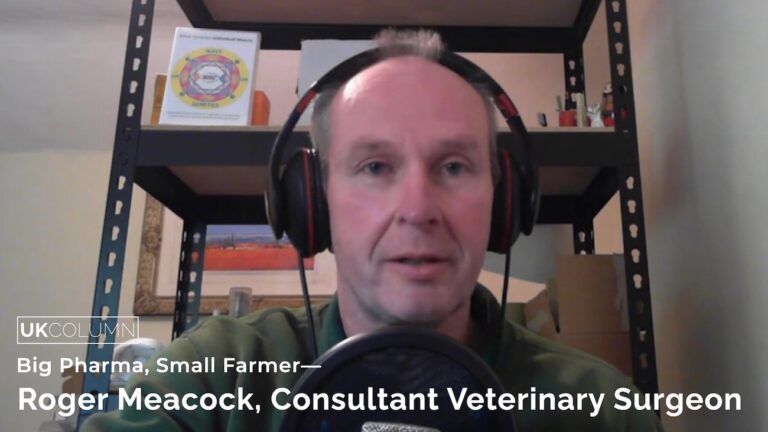Roger Meacock BVSc MRCVS (previously interviewed by the UK Column about mRNA injections in animals and animal feeding) is a Consultant Veterinary Surgeon. The words “do no harm” mean as much in the veterinary world as they do in human medicine. He has been at the forefront of quantum veterinary medicine in the UK for the past 25 years and is referred to by many as “the one and only” or “the last chance vet”. Roger Meacock goes a step further and often sees animals that are too sick to be treated with existing medicine. He never promises the impossible but if he thinks he can help he usually does. You can contact his practice: Natural Healing Solutions.
Is the world of British farming bright and beautiful or have we as a nation lost our ability to feed ourselves? To what extent do we rely on imports from other countries to feed ourselves? Roger Meacock sheds some much-needed light on the current state of our farming.
Every day, millions of people shop at the supermarket, packing their trolleys and baskets with breakfast, lunch and dinner for themselves and their families, but how many of us have ever stopped to think about where it all comes from? Was it really centuries ago that Britain was self-sufficient and able to feed itself without relying on imports from abroad?
Although allotments themselves have existed for hundreds of years, the allotments we know today began in the 19th century, when poor people were given land to grow food on. With the rise of welfare systems, allotments became less essential for survival and are now managed by gardening enthusiasts with limited or no outdoor space or gardens to grow plants, vegetables, fruit or simply enjoy some sunshine.
“Grow your own” was a catchphrase we often heard until recently. And we did. Shortly after the end of the Second World War, rationing was over and the government instructed farmers to increase production to meet the needs of the people. The days of rationing and hunting for dinner were over and all eyes were on the country's farmers and soon on the supermarkets to meet the needs of the people. But at what cost? Agriculture seems to be demonized by society. Has the farmer's mission lost its true meaning? With many farmers being forced to give up their land for solar and wind farms, what will the UK look like when Animal Farm is virtually gone? Will we all be forced to eat a plant-based diet or insects? Are humans equipped anatomically and physiologically to survive on a plant-based diet? The answer is simply no. Roger Meacock explains why.
If we want to save farms, we need to have honest conversations. There are difficult questions that require honest answers: What is “species-appropriate food”? Why don't wild animals get too fat? Who controls the pests that threaten our crops? Do animals die to produce vegan food? Are slaughterhouses as horrific places as people make them out to be, or is nature even more cruel? Are we in danger of demonizing farmers? If so, why have we allowed this to happen?
Agriculture has changed beyond recognition from just 20 years ago. Roger Meacock has observed its development throughout his career as a veterinarian. We asked him what the public can do to save our valuable but declining agricultural industry. With many farmers struggling to make a living and working increasingly long hours for little pay, how can we encourage them to cut out the greedy supermarket middleman and sell directly to us? Roger revealed that many farmers are known to work 40 hours in just two days. You can't predict when a calf or lamb will be born. It's a 24/7, highly pressured job that often has more risks than benefits. How can we help farmers resist the temptation to rent out their land to people who want to build cell phone towers? And how does that affect the animals that live there? Indeed, how does it affect farmers and their families?
Let's also think about the control the pharmaceutical industry has over farmers, in a world where big pharma seems to dominate our lives. How do big pharma affect small farmers? You might be surprised to find that the impact is minimal, due to the high cost of medicines. Farmers do not want to give their animals more medicine than absolutely necessary, because overdosing may mean the animal cannot be marketed or slaughtered. It is reassuring to have Roger Meacock tell us that animal welfare in the UK is excellent and that contrary to urban myth, British animals are safe. do not have It's full of medicines. But what about the condition of the animals imported from other countries?
As more and more small farms disappear from the landscape, how long will it be before they disappear forever? In the 15-minute city, agriculture does not exist, 'Vertical farming'and livestock Floating PlatformIf British people want to “keep British farming” and keep our fields green, are they prepared to go to farms to buy direct? The saying “no need to take it easy” is very true. But unless farmers trust us and we trust them to supply us directly, we will all be crying one day when we wake up to find that farming is just a distant memory. And then it will be too late.
If you are a farmer or vet who would like to contribute to the UK Column conversation, please get in touch – we'd love to hear from you.
Buy British, buy local and support local farmers.


